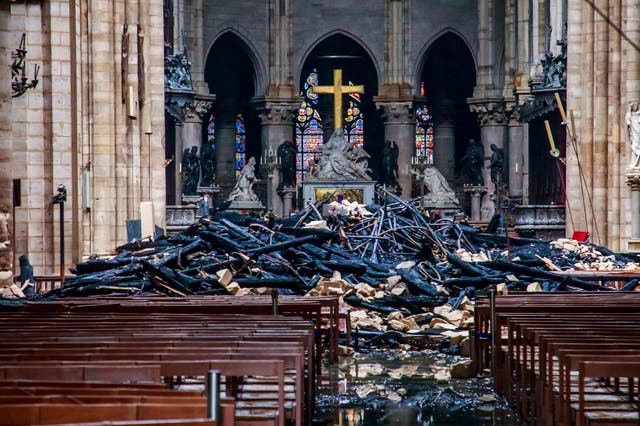Notre Dame reopens its doors in rare symbol of global unity
The cathedral has been restored just five years after it was devastated by fire.

France’s historic Notre Dame Cathedral has reopened its doors for the first time since a devastating fire nearly destroyed the 861-year-old landmark in 2019.
The restoration, a spectacular achievement in just five years for a structure that took nearly two centuries to build, is widely seen as a moment of triumph for French President Emmanuel Macron, who championed the ambitious timeline – and a welcome respite from his domestic political woes.
Under the luminous stained glass, many world leaders, dignitaries, and worshippers gathered in Paris in the evening to mark the occasion – a rare moment of unity against the backdrop of global divisions and conflicts.

The Prince of Wales, America’s first lady Jill Biden, and US President-elect Donald Trump, along with nearly 50 heads of state and government and personalities – 1,500 guests in all – attended the reopening celebration under Notre Dame’s soaring Gothic arches, led by Archbishop Laurent Ulrich.
Instead of starting from the cathedral’s forecourt as initially planned and because of strong winds forecast for Saturday evening in Paris, the French presidential palace and the Paris diocese said on Friday the entire opening ceremony will be held inside Notre Dame.
Notre Dame’s rector, the Rev Olivier Ribadeau Dumas, said the cathedral is “more than just a French monument” and a beloved treasure of world’s cultural heritage.

“The cathedral is a magnificent symbol of unity,” the rector said. “A sign of hope, because what seemed impossible has become possible.”
Saturday’s events will blend solemn religious tradition with cultural grandeur, starting with Archbishop Ulrich symbolically reopening Notre Dame’s grand wooden doors.
Tapping them three times with a staff crafted from charred wood salvaged from the cathedral’s fire-ravaged roof, he declared the cathedral open for worship once more.
Psalms, prayers, and hymns will fill the cavernous space as the cathedral’s thunderous organ, silenced since the fire, is reawakened. The 8,000-pipe instrument, painstakingly restored and cleaned of toxic lead dust, will respond to the archbishop’s invocation, with four organists performing an improvised interplay of melodies.

Later in the evening, a star-studded concert will take centre stage inside the cathedral and pay tribute to its resurrection and to those who laboured to restore it, offering a universal message of harmony.
Pianist Lang Lang, cellist Yo-Yo Ma, and soprano Pretty Yende are among the world-famous artists slated to perform.
On Sunday, Archbishop Ulrich will lead the inaugural Mass and consecrate the cathedral’s new altar, designed by contemporary artist Guillaume Bardet to replace the one crushed beneath the flaming spire in the blaze.
Nearly 170 bishops from France and abroad will attend the Mass, alongside priests from all 113 parishes of the Paris diocese.

The reopening of Notre Dame comes at a time of profound unrest world over, with wars raging in Ukraine and the Middle East.
For Catholics and Notre Dame’s rector, the cathedral “carries the enveloping presence of the Virgin Mary, a maternal and embracing presence”.
“It is a magnificent symbol of unity, a sign of hope,” the Rev Dumas said.
Other dignitaries coming to Paris for Notre Dame’s rebirth include European Commission President Ursula von der Leyen and UN Secretary-General Antonio Guterres, underlining the cathedral’s significance as a symbol of shared heritage and peace.

The celebration is expected to give a much-needed boost to embattled Mr Macron, whose Prime Minister resigned this week, plunging the nation’s political scene into more turmoil.
The French President, who has called Notre Dame’s reopening “a jolt of hope”, will address the gathering. He had hoped the occasion would briefly silence his critics and showcase France’s unity and resilience under his leadership.
The ambitious five-year restoration timeline, announced just a day after the 2019 fire, had seemed improbable to many but its achievement serves as a testament to Mr Macron’s can-do attitude.
His presidency faces its gravest crisis after the government’s collapse this week in a historic no-confidence vote that toppled Prime Minister Michel Barnier after just three months – the shortest tenure of any government in the history of the Fifth Republic.
The vote followed months of political gridlock after snap elections. Calls are now growing louder from centrists and opposition forces on the far left and right for Mr Macron, whose approval ratings have plummeted, to resign.

But he vowed in an address to the nation on Thursday night to remain in office until the end of his term in 2027, and said he will name a new prime minister within days.
As France struggles with economic woes and mounting social unrest, Notre Dame’s rebirth celebrations is a stark contrast to the crisis.
Security will be tight all through the weekend, echoing measures taken during the Paris Olympics earlier this year.
The Ile de la Cite – the small island in the River Seine that is home to Notre Dame – will be closed to tourists and non-residents, with access restricted to invitees and those who live on the island.
Public viewing areas along the Seine’s southern bank will accommodate 40,000 spectators, who can follow the celebrations on large screens.
Archbishop Ulrich’s reopening the cathedral doors will be followed by a liturgical service and the reawakening of the grand organ, ending with the celebratory concert that will honour Notre Dame’s cultural and spiritual significance.
For many, Notre Dame’s rebirth is not just a French achievement, but a global one – after the reopening, the cathedral is set to welcome 15 million visitors annually, up from 12 million before the fire.
Following the 2019 fire, nearly one billion dollars (£784 million) in donations quickly poured in from every corner of the world, testifying to Notre Dame’s universal appeal.





